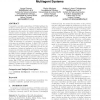Free Online Productivity Tools
i2Speak
i2Symbol
i2OCR
iTex2Img
iWeb2Print
iWeb2Shot
i2Type
iPdf2Split
iPdf2Merge
i2Bopomofo
i2Arabic
i2Style
i2Image
i2PDF
iLatex2Rtf
Sci2ools
ATAL
2015
Springer
2015
Springer
Cooperative Coevolution of Partially Heterogeneous Multiagent Systems
Cooperative coevolution algorithms (CCEAs) facilitate the evolution of heterogeneous, cooperating multiagent systems. Such algorithms are, however, subject to inherent scalability issues, since the number of required evaluations increases with the number of agents. A possible solution is to use partially heterogeneous (hybrid) teams: behaviourally heterogeneous teams composed of homogeneous sub-teams. By having different agents share controllers, the number of coevolving populations in the system is reduced. We propose HybCCEA, an extension of cooperative coevolution to partially heterogeneous multiagent systems. In Hyb-CCEA, both the agent controllers and the team composition are under evolutionary control. During the evolutionary process, we rely on measures of behaviour similarity for the formation of homogeneous sub-teams (merging), and propose a stochastic mechanism to increase heterogeneity (splitting). We evaluate Hyb-CCEA in multiple variants of a simulated herding task, and ...
Related Content
| Added | 16 Apr 2016 |
| Updated | 16 Apr 2016 |
| Type | Journal |
| Year | 2015 |
| Where | ATAL |
| Authors | Jorge C. Gomes, Pedro Mariano, Anders Lyhne Christensen |
Comments (0)

